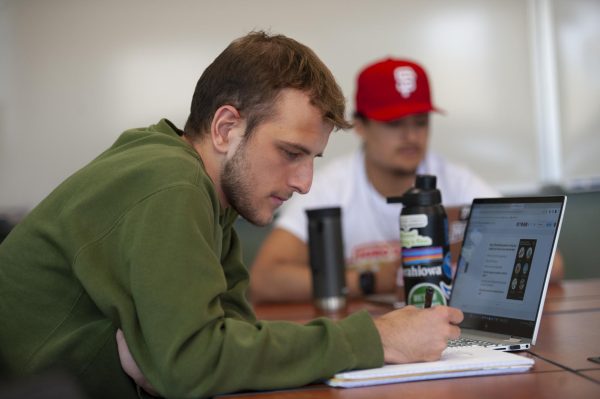Please, give Senate candidates a mic
The Senate election this year was, quite frankly, a dull experience. Coming from an international high school, my expectations were high: an invested and well-publicized campaign, a heated presidential debate, and the utter excitement of awaiting the decision of the next leader. Sadly, none of that occurred at Luther. Don’t get me wrong, I totally admire the executive board, and I am certain that they will be incredible leaders, but a superficial election experience will only do us harm.
Even though each person’s experience with the Senate election differs, it is typically this: You saw some of your friends reposting a campaign on their Instagram stories, and you found out that an election was ongoing. Then, one day, you suddenly woke up with an email from the Senate about the election. You encountered a Senate member doing tabling at the Union asking you, “Have you voted?” for the 20th time. You went through your ballot and realized you had no idea who 50% (or more) of the candidates were, so you decided to vote for the more familiar names — if you even voted at all. Days later, you received an email about the names of the new senators. You likely forgot all the names about two days later, and won’t remember them until the next election happens.
This should not be the way you experience a college election. Compared to other student senate elections from other colleges (or even high schools), this experience is just boring. Throughout the campaigning process, I only saw one proper campaign going on, and others were either word-of-mouth or nothing at all. The entire voting process was just the ranking of the people that are familiar to you. That hinders the potential of actually promising candidates with policies that would benefit us. An election should be a competition of speakers and policymakers who demonstrate their potential to best serve the student body and not a simple text message saying, “Hey I’m your friend, so vote for me.”
What if you get to this point and think to yourself, “Well, the Student Senate is already incompetent, so why do I even have to care?” That is the problem. Since the establishment of a new student government has been undermined from the very beginning, it is very hard for the new board of leaders to create change if nobody really knows who they are. A well-invested election should be the starting point for a bigger impact. Students should be able to see an actual competition between candidates, listen to their proposals, and make a decision based on their rational evaluation.
People have been talking about how the Senate can empower students, but have forgotten to talk about how the Senate can be empowered from within. In the future, I believe that the election season can be improved. All candidates should be required to create some form of campaign and communicate their proposals to students via platforms such as social media, tabling, or posters around campus. More importantly, a presidential and vice presidential debate should definitely occur. This is the way the future Senate leaders are able to demonstrate their skills as a way for them to thoroughly implement their changes in the future.
If you are planning to be a Senate candidate in the future, you should be mindful of the way you campaign yourself. Senate leaders should be required to carry out a proper campaign. They should win because they have the courage to speak out and have demonstrated the ability to represent the student body. Leadership is not just a popularity contest, but it is the art of communicating and uniting people.






Salomé • May 7, 2023 at 6:44 pm
Hi Bao. For clarification and reference, we did have a presidential debate, we called it “Presidential Forum.” So maybe double-checking those facts could have been helpful for your argument. Kind regards,
Jaraad Afroze Ahmed • May 7, 2023 at 3:06 pm
Interesting take! Though I do believe you have missed the credit due to the Election Committee and all standing senators, for the reasons that there was an Election Forum that took place on April 15th in the Student Organizational Suite Office. It seems as if the issue addressed in this article lies with your dislike of the lack of campaigning, which is a very real issue as we struggle with overall student engagement (not just in Student Senate but all of our Student Organizations and constituency groups). That being said, I would like to take this opportunity to address that social peering perspectives like yours are very much welcome at our General Senate meetings on Thursdays during shadow block (no more meetings left this academic year), and future Election Forums.